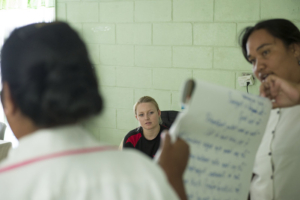Everything You Need to Know About Women’s Rights in Kiribati
 Kiribati is an island country formed in 1979 that is located in Oceana. Despite having a smaller population compared to its neighbors, Kiribati has been steadily growing in its economic power ever since its inception. One can attribute this partly to women’s rights in Kiribati, which have been prominent ever since the country’s inception.
Kiribati is an island country formed in 1979 that is located in Oceana. Despite having a smaller population compared to its neighbors, Kiribati has been steadily growing in its economic power ever since its inception. One can attribute this partly to women’s rights in Kiribati, which have been prominent ever since the country’s inception.
Within the Law
Women have always had the right to vote in Kiribati, as that was codified when the country was first granted independence. Despite this strong foundation for women’s rights, women only make up 6.67% of representation in national parliament in Kiribati, compared to a global average of 25.09%.
The Kiribati constitution does not protect individuals from discrimination based on gender. However, certain protections for women have recently been passed. Violence against women, namely sexual assault, is treated as a crime and prosecuted accordingly. The punishment for this includes a maximum life sentence of life in prison for rape specifically, though the mean amount of jail time rests around four years.
In 2018, the Kiribati Women and Children’s Support Center was opened and launched a 24-hour hotline for survivors of sexual violence and domestic abuse. This marked a turning point for women’s rights in Kiribati, and contributed to broader efforts of spreading awareness about sexual assault in the region.
Inside the Schools
Literacy rates for women are above average at 98.61% ( the world average is 82.03%). One can attribute this to the universal education for youth Kiribati provides. Girls are actually more likely to complete their primary education than boys, and this emphasis of literacy and education allows for women in Kiribati to attain economic empowerment. Furthermore, the Education Act of 2013 solidified education for all by codifying protections against women and girls by outlawing refusal of enrollment based on sex.
Unfortunately, girls’ attendance in school drops exponentially after primary education. Only 87% of girls go on to complete junior secondary education, and then just 63% complete senior secondary education. This is for a variety of factors, but poverty is the main reason. Often, parents will pull their children out of school following primary or junior secondary school in order for them to help earn enough money to put food on the table. The wealthiest children in Kiribati have a 71% chance of completing their education, while the poorest have only a 35% chance.
Women and Poverty
While women in Kiribati tend to have more education than men on average, this does not necessarily mean that their quality of life or financial standing is any better. In fact, the unemployment rate for women in Kiribati was up to 12.4% in 2020, almost 2% more than men. The labor force participation rates contain similar disparities, with men having a 54.4% labor force participation rate, and women only reaching 40.5%. There are a variety of factors behind this, but gender gaps and a lack of supportive policies to help combat unfair hiring practices are often cited as main reasons. Due to this, women in Kiribati are at a higher likelihood of living in poverty.
Despite this, there are concerted efforts from various organizations within Kiribati to help women and girls fight poverty. One of the most prominent organizations in the area is called Teitoiningaina, which is the National Catholic Women’s Association of Kiribati. This organization focuses on improving the lives of women in Kiribati by offering family health care, offering programs to help women in Kiribati get an education and providing classes on business.
Looking Ahead
Although the rate of violence against women in Kiribati is proportionally high, new government programs help provide support to survivors and further criminalize violence against women. Not only that, but the rate of literacy for women exceeds the standard for the region by far and gives women the opportunity to have more economic power and autonomy than they otherwise might not have. While there is still work to be done for women’s rights in Kiribati, the region is on the path to success.
– Mackenzie Scott
Mackenzie is based in Indianapolis, IN, USA and focuses on Good News for The Borgen Project.
Photo: Flickr
